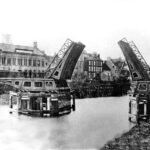19 October 1775: Mayor Joseph Outram lays the first stone of Hull’s first dock and customs quay, dooming the town’s walls and commencing its great expansion
John Tickell. 1798. The History of the Town and County of Kingston Upon Hull. Hull: Thomas Lee. Get it:
.Excerpt
That day was ushered in with the ringing of bells. The company’s commissioners, and their four principal officers, met at the dock-office at twelve o’clock, and proceeded from thence with colours flying to the mayor’s house, where being elegantly regaled with cake, wine, etc. they proceeded from thence with the mayor, preceded by a large band of music, constables and flags, to the lock pit, where his worship laid the first stone, in the presence, and with the loud acclamations of some thousands of people. The mayor then gave the workmen fifteen guineas [ca. £2,602 in 2020] to drink, five on his own account, and ten on account of the company, after which there was a discharge of nine cannon, placed at the entrance of the lock, and then the procession proceeded to Mr. Baker’s, the Cross-Keys, in the market-place, where an elegant dinner was provided. After dinner the healths of the king, queen, and royal family, with many other loyal and constitutional toasts were drank, and the whole was concluded with the greatest unanimity and good order.
Comment
Comment
A “fourteenth-century plan” shows previous arrangements – “trading ships moored in the river Hull — the ‘Old Harbour,’ as we call it to-day — on the right bank of which are the cranes for removing their cargoes”:

(Browne 1912)
Something to say? Get in touch
Original
In the beginning of the reign of queen Elizabeth, an act passed for the establishment of legal [i.e. customs] quays at all the ports in England, with an exception of that of Hull only; and soon after the restoration, a similar act was passed, subject to the same exception. From this partiality, however, to this town, and from the incommodious situation of the haven, in which the business of the port, together with the revenue, was transacted, several inconveniences were found to arise, and none more sensibly felt than what respected the revenue. In the year 1746, it seems, many illegal practices were discovered, and the revenue boards became not a little dissatisfied with the mode of transacting business at this port. Officers of the customs were dismissed in quick succession, and various regulations were attempted, by the direction of the commissioners, without producing the desired effect. Surveyors were sent down here, who confirmed by their reports the absolute necessity of establishing legal quays, in order that the business of the revenue might be conducted in the same manner here, as in the other ports of the kingdom.
In 1766 application was made to government for a grant of part of the king’s works [i.e. fortifications] near to the garrison, for the purpose of enlarging the haven. But as this application did not coincide with the opinion of the commissioners of the customs (a legal quay not making part of the intended improvements) they, therefore, interfered and prevented the application taking effect, unless the legal quay and enlargement of the haven should go hand in hand with each other. Six years after, this important affair was again revived; and although the necessity of a compliance by the town appeared evident and urgent, and a refusal on their part dangerous to the very existence of the port, yet, strange as it may appear, such was the opposition to any proposed alteration, that it was found impracticable to those who were desirous of carrying the plan into execution.
In the year 1773, however, a bill was brought into parliament for the purpose of establishing and making a legal quay, together with a dock or bason adjoining to the haven or old harbour, but from the same cause of disappointment as before, a deficiency in the subscription, the business was laid aside for that year.
But in the ensuing session of 1774 a further attempt was made, and those who were determined to co-operate with the propositions of the revenue boards, applied to their friends to assist them with subscriptions, for the promoting of an undertaking of such general utility. Two years previous to this it had been signified by the customs, to the collector and comptroller, that unless the town of Hull would immediately co-operate with the board of customs in the establishment of a legal quay here, they were determined to establish one at some other place, connected with the river Humber.[Tickell: The inhabitants of this town, it seems, during many years, were, from various causes, averse to such an establishment taking place here. Some endeavoured to persuade themselves that the scheme was chimerical: others were apprehensive of a diminution in the value of their property, which being situated in another part of the town, would not be connected with the intended dock: others were so unwilling to submit to that alteration in the mode of doing business in the old harbour, which had been so frequently desired by the revenue boards, that a contest on that subject, between the commissioners of the customs, and this town, continued fron the year 1746 to 1772.]
At the same time the merchants of Gainsborough presented a memorial to the lords of the treasury, soliciting that such a quay might be established at their town. This memorial was introduced and strongly enforced by Lord Gower, with all the weight of interest which that noble lord was able to cast into the scale.
This important business had now assumed a most serious aspect, and convinced those whom it most concerned, that no more time was to be lost. During this imminent danger to the interest of the trade and commerce of this port, the corporation of the mayor and burgesses prudently closed in with, and accepted the offers of the commissioners of the customs, communicated through Mr. Corthine, collector of the customs here, and thereupon allotted to the Trinity House, and such inhabitants of the town as were willing to subscribe, shares, into which the undertaking was intended to be divided. The subscription was kept open for some time for the inhabitants of Hull, in preference to any other persons, after which recourse was had to persons resident in other places to complete the subscription. Soon after the acceptation of the proposal made to them by the commissioners of the customs, by the corporation of mayor and burgesses, upon the dependance of a support from government with money, which Mr. Corthine had intimated to them, several conferences were had with the lords of the treasury by Joseph Sykes, esq. as delegate from the mayor and burgesses, William Hammond, esq. from the Trinity-House, and William Waller, esq. from the merchants of Hull, in order to ascertain the sum to be contributed by government towards the completion of the works: in these conferences the delegates were assisted by Sir George Savile and other respectable persons who wished to promote a work of such general utility, and at length the sum of fifteen thousand pounds, in addition to the grant of the military works, was fixed upon.
Thus this tedious but important affair being, at length, about the beginning of the year 1774, brought to this favorable crisis, in the month of April, the same year, the act passed for carrying the works into execution, and the subscribers were thereby incorporated by the name of “the dock company, at Kingston-upon-Hull.”[14 Geo III, cap.56, of 20.5.1774] This company were empowered and required by this act, within the space of seven years, from and after the 31st of December, 1774, to make
a bason or dock to extend from the river Hull to a certain place in the town of Kingston-upon-Hull, called the Beverley gates, or as near thereto as conveniently might be, and to make the same in all parts equal in depth to the bed of the river, or at least within fifteen inches of the same, for the admission of loaded ships, and of such width at the least as the ground granted by the act would admit.
And that the said company should and might likewise cause to be made and provided such reservoirs, sluices, bridges, roads and other works, as they should from time to time adjudge necessary for the more convenient use of the said bason or dock, and the general benefit of shipping and the trade and commerce of the said port; and that the said company should and might also build or cause to be built, within the said space of seven years, a quay or wharf of a sufficient and convenient length for the trade and business of the said town and port, which shall range along the side of the said bason or dock next the town.
In consideration of the great charges and expenses attending an undertaking of such magnitude, and for the future maintaining of the dock and quay, it was enacted, that from and after the 31st of December, 1774, there should be paid to the company, certain rates or duties, specified in the act, by all ships frequenting the port.[The rates or duties of tonnage are as follow, viz.:
For every vessel coming to, or going between the port of Hull, and any port to the northward of Yarmouth in Norfolk, or any port to the southward of the Holy Island, for every ton, two pence.
For every vessel coming to or going between the port of Hull, and any place between the North Foreland and Shetland, on the east side of England, for every ton, three pence.
For every vessel trading between the port of Hull, and any other place in Great Britain, not before described, for every ton, sixpence.
For every vessel trading between the port of Hull, and any place in the Baltic seas, and all other places above the Sound, for every ton, one shilling and three-pence.
For every vessel trading between the port of Hull, and any place in Denmark, Sweden, or Norway, below Elsinore, or any place in Germany, Holland, Flanders, France, to the eastward of Ushant, Ireland, the islands of Guernsey and Jersey, for every ton, tenpence.
For every vessel trading between the port of Hull, and any island, or place of Europe, to the westward of Ushant, without the straits of Gibraltar, for every ton, one shilling and three-pence.
For every vessel trading between the port of Hull, and every place in the West-Indies, north or south America, Africa, Greenland, or any place to the eastward of the North Cape or Norway, all places within the straits of Gibraltar, and all places in the ocean to the southward of Cape Saint Vincent, not hereinbefore named, for every ton, one shilling and nine-pence.
For every foreign vessel coming to or going with merchandise from any of the above-named places, double the rates, tonnage, or duties above-mentioned, unless the ship belong to British owners.
For every vessel sailing coastwise or otherwise, and coming into the haven to be laid every ton (coasting duty included) sixpence.
These duties, together with the same rates of wharfage for goods discharged upon the quay, as is paid in the port of London, are vested by the act in the dock company, who are thereby authorised, upon examining the accounts to be kept for the works to be made and maintained in pursuance of the act, to lower the duty, and to raise it again from time to time, so as when raised, the duties do not exceed those specified in the act.]
Soon after the passing of this act, the company proceeded with spirit and alacrity in the execution of the work, and by their unremitted exertions made so quick a progress, that instead of taking the full term of seven years, allowed them by the act, completed the dock in four years, on a plan much larger than was required by the act. This spacious dock contains 48,188 square yards (near ten acres) and the quay 17,479 square yards, or a little more than three acres and a quarter. Whereas had the dock and quay been confined to the ground granted by the act, the former would have contained only 43,518, and the latter 11,162 square yards.
The first stone of this famous dock was laid by the mayor on Thursday the 19th of October, 1775, as appears from the following memorial in the dock-office:
Dock-office, Kingston-upon-Hull, October 11th, 1775, ordered, that the first stone of the lock be laid on Thursday the 19th instant, and that Joseph Outram, esq. mayor, be requested to perform the ceremony, as is customary in works of this magnitude. The inscription on the said stone to be in the following words engraved on a copper plate.
For the improvement of commerce by the enlargement of the port of Kingston-upon-Hull, his most gracious majesty King George the Third, did, with the consent of his parliament, appropriate the military works surrounding the town, with a further aid of royal and parliamentary munificence. In gratitude to their gracious sovereign, and to transmit a dutiful remembrance thereof to the latest posterity, the dock company have caused this to be inscribed on the first stone, which was laid by Joseph Outram, esq. mayor, October 19th, 1775.
That day was ushered in with the ringing of bells. The company’s commissioners, and their four principal officers, met at the dock-office at twelve o’clock, and proceeded from thence with colours flying to the mayor’s house, where being elegantly regaled with cake, wine, etc. they proceeded from thence with the mayor, preceded by a large band of music, constables and flags, to the lock pit, where his worship laid the first stone, in the presence, and with the loud acclamations of some thousands of people. The mayor then gave the workmen fifteen guineas [ca. £2,602 in 2020] to drink, five on his own account, and ten on account of the company, after which there was a discharge of nine cannon, placed at the entrance of the lock, and then the procession proceeded to Mr. Baker’s, the Cross-Keys, in the market-place, where an elegant dinner was provided. After dinner the healths of the king, queen, and royal family, with many other loyal and constitutional toasts were drank, and the whole was concluded with the greatest unanimity and good order.
From the above period the work proceeded without any interruption, till the whole was completed, and brought to its present state, in 1778. In the month of August that year, a ship in the Greenland trade, called the Manchester, was the first that sailed into the dock, and was followed by another, called the Old Favourite. On an occasion of so much importance to the growing commerce of the town, an immense concourse of people crowded in from all parts of the neighbourhood; so that it may be questioned whether this town has ever been more thronged with people, except on the day of the celebration of the centenary of the revolution. At four o’clock in the morning the drums beat round the town, the people in incredible numbers assembled round the dock, the dock company proceeded with an excellent band of music to the bason, and went on board the Manchester, which on this occasion was decorated with colours in great profusion, and presented to the pleased spectators a most elegant and uncommon sight. At eight o’clock the gates were opened, the colours hoisted, and the two ships entered the dock in all the magnificence of naval triumph. The soldiers who lined the ways between the river and the draw-bridge, fired volleys of small arms, and the cannon were discharged; at night the Favourite was hung with lanterns.
Since the finishing of this dock, business is transacted here with the greatest ease and convenience, unattended with the labour, and with much less hazard and loss of time than ships can usually be laden and unladen in sea ports destitute of such convenient receptacles. Ships of the largest burthen are inclosed with a sufficient depth of water, confined within flood-gates, to keep them afloat; and when loading or unloading can bring their broadsides to the quay, which affords a sufficient extent of ground for the reception of goods, imported from most parts of the whole world.
And according to the report of Messrs. Brown and Pilkington, two surveyors appointed by the commissioners of the customs, to make observations and remarks on these works, the dock and Hull are the most complete of any in this kingdom.
[A list of distinguished local subscribers, demonstrating that previous opposition had been abandoned]
2564 words.
Similar
 17 August 1778: Civil engineers John Smeaton and John Wooler explain how to use the River Hull to flush the dock which has replaced the northwest section of the city walls
17 August 1778: Civil engineers John Smeaton and John Wooler explain how to use the River Hull to flush the dock which has replaced the northwest section of the city walls 1 July 1840: The opening of the Hull and Selby Railway terminates the threat to Hull’s port from Goole, Scarborough and Bridlington
1 July 1840: The opening of the Hull and Selby Railway terminates the threat to Hull’s port from Goole, Scarborough and Bridlington 3 July 1837: The Swan, a Hull whaler, returns from the dead (the ice of the Davis Strait) bearing three whales
3 July 1837: The Swan, a Hull whaler, returns from the dead (the ice of the Davis Strait) bearing three whalesSearch
Donate
Music & books
Place-People-Play: Childcare (and the Kazookestra) on the Headingley/Weetwood borders next to Meanwood Park.
Music from and about Yorkshire by Leeds's Singing Organ-Grinder.


 Bluesky
Bluesky Extwitter
Extwitter